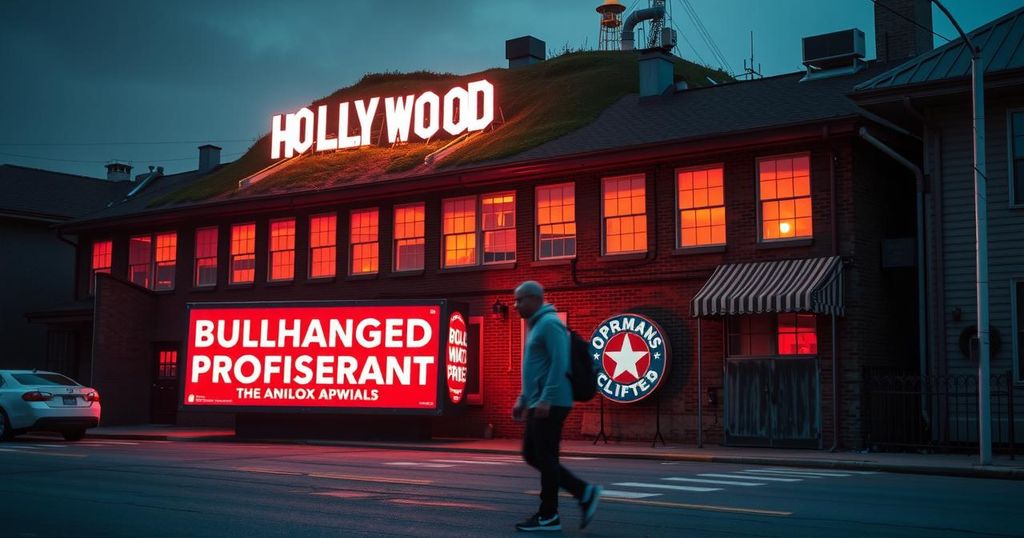Understanding the Climate Realities of California and Beyond
The article discusses the severe impact of climate change on California, especially Los Angeles, where inherent aridity exacerbates the effects of rising temperatures and frequent wildfires. It critiques historical attempts to transform the landscape into a lush environment and highlights the ongoing failure to adapt to the region’s natural dryness. Additionally, it addresses the inadequate political response to climate change and its implications for affected communities.
The catastrophic consequences of climate change are becoming increasingly evident as the extreme weather events wreak havoc across various regions, including the destructive wildfires encircling Los Angeles. While these fires can be attributed in part to rising temperatures, they are more intrinsically linked to the inherent aridity of California itself. Despite Hollywood’s aspirations to fabricate lush outdoor environments, the reality is that much of the West has always been drought-prone and continues to become drier due to climate change.
Los Angeles is experiencing more severe and frequent droughts, surpassing the dry conditions of cities like Beirut. Moreover, places such as Sacramento face aridity comparable to that of the Sahel, while even San Francisco’s annual rainfall is minimal in comparison to regions like Chihuahua. Marc Reisner’s seminal work, “Cadillac Desert: The American West and Its Disappearing Water,” articulated these grim realities nearly forty years ago, highlighting the extensive efforts made to manipulate the region’s natural water scarcity.
The historical context reveals that American settlers attempted to impose their vision of verdant landscapes onto the arid West, oblivious to its unique ecology. By 1878, John Wesley Powell had delineated a boundary, the “Hundredth Meridian,” distinguishing the more humid East from the arid West. Urban areas such as San Francisco have gradually adapted through complex water diversion systems to support their growth, an endeavor that now faces further complications due to climate change.
The growing aridity of California, coupled with a concerning political landscape that is resistant to addressing climate change, poses an ongoing challenge. Despite proposals from contemporary leaders to combat climate issues, the harsh realities of the West’s climate are steadfast. As exemplified by the Catastrophic Camp Fire in 2018, communities are vulnerable to massive natural disasters that devastate lives and infrastructure. Residents are now left to ponder whether they can adapt to an increasingly inhospitable environment as they consider rebuilding in a persistently dry landscape.
Ultimately, America is confronted with a leadership that is less than committed to tackling the urgent challenges posed by climate change, perpetuating a situation where the natural dry state of the American West remains unaltered. It is essential to acknowledge and adapt to the inevitabilities of the climate—nature crafted this region’s climate, and human efforts cannot wholly modify it.
The article addresses the severe impact of climate change on regions like California, particularly Los Angeles, where recurring drought and wildfires significantly affect communities. It explores how historical efforts to manipulate the natural environment to recreate lush landscapes have failed to confront the realities of the West’s inherent aridity. The discussion also critiques the current political leadership’s inadequacy in addressing climate change, exacerbating the existing environmental challenges faced by these regions.
In conclusion, the article underscores the irreversible realities of California’s climate and the challenges posed by climate change, particularly for regions like Los Angeles. It highlights the incongruity between human attempts to recreate a humid environment in a naturally arid landscape and the relentless progression of climate change. As communities are left to cope with devastating wildfires and droughts, it becomes increasingly imperative to confront these environmental realities rather than deny or obscure them. With a leadership that is resistant to meaningful climate change action, the future of the West appears particularly precarious.
Original Source: www.creators.com




Post Comment